牛津英语八下Unit3Traditional skills知识点
- 格式:doc
- 大小:33.04 KB
- 文档页数:4
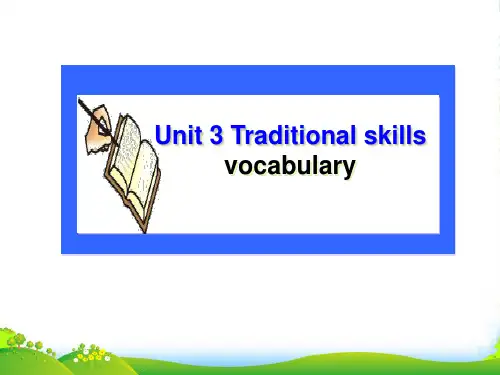
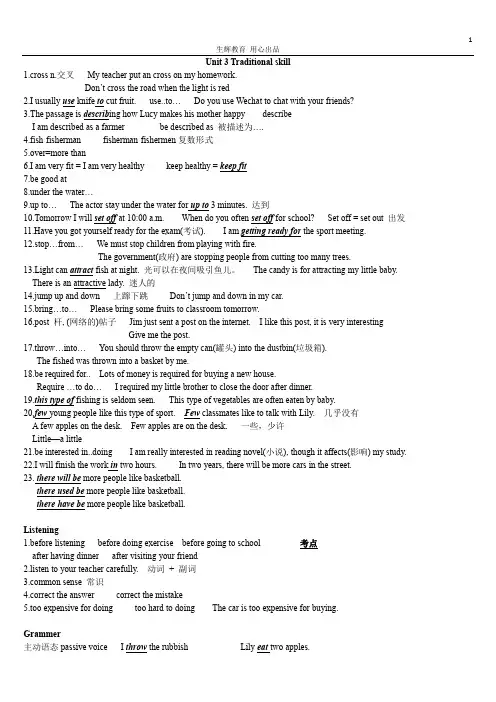
Unit 3 Traditional skill1.cross n.交叉My teacher put an cross on my homework.Don’t cross the road when the light is red2.I usually use knife to cut fruit. use..to…Do you use Wechat to chat with your friends?3.The passage is describ ing how Lucy makes his mother happy describeI am described as a farmer be described as 被描述为….4.fish-fisherman fisherman-fishermen复数形式5.over=more than6.I am very fit = I am very healthy keep healthy = keep fit7.be good at8.under the water…9.up to…The actor stay under the water for up to 3 minutes. 达到10.Tomorrow I will set off at 10:00 a.m. When do you often set off for school? Set off = set out 出发11.Have you got yourself ready for the exam(考试). I am getting ready for the sport meeting.12.stop…from…We must stop children from playing with fire.The government(政府) are stopping people from cutting too many trees.13.Light can attract fish at night. 光可以在夜间吸引鱼儿。
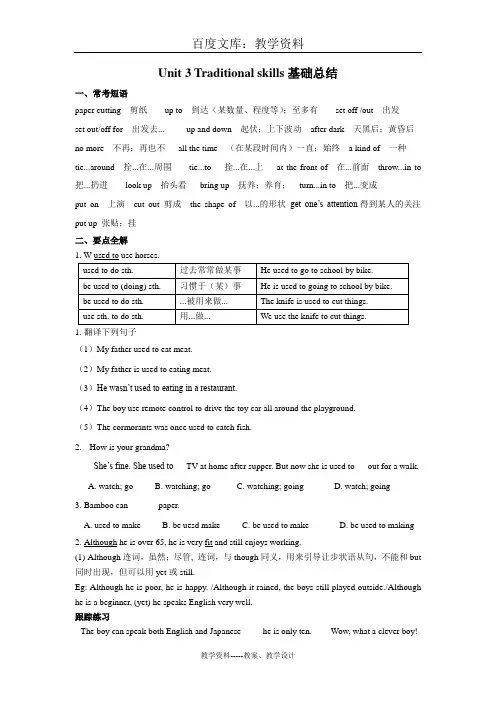
Unit 3 Traditional skills基础总结一、常考短语paper cutting 剪纸up to 到达(某数量、程度等);至多有set off /out 出发set out/off for 出发去... up and down 起伏;上下波动after dark 天黑后;黄昏后no more 不再;再也不all the time (在某段时间内)一直;始终 a kind of 一种tie...around 拴...在...周围tie...to 拴...在...上at the front of 在...前面throw...in to 把...扔进look up 抬头看bring up 抚养;养育;turn...in to 把...变成put on 上演cut out 剪成the shape of 以...的形状get one’s attention得到某人的关注put up 张贴;挂二、要点全解1. W used to use horses.1.翻译下列句子(1)My father used to eat meat.(2)My father is used to eating meat.(3)He wasn’t used to eating in a restaurant.(4)The boy use remote control to drive the toy car all around the playground.(5)The cormorants was once used to catch fish.2.--How is your grandma?--She’s fine. She used to __ TV at home after supper. But now she is used to __ out for a walk.A. watch; goB. watching; goC. watching; goingD. watch; going3.Bamboo can ______ paper.A. used to makeB. be uesd makeC. be used to makeD. be used to making2.Although he is over 65, he is very fit and still enjoys working.(1)Although连词,虽然;尽管, 连词,与though同义,用来引导让步状语从句,不能和but 同时出现,但可以用yet或still.Eg: Although he is poor, he is happy. /Although it rained, the boys still played outside./Although he is a beginner, (yet) he speaks English very well.跟踪练习--The boy can speak both English and Japanese ____ he is only ten. --Wow, what a clever boy!A. ifB. becauseC. althoughD. When(2)fit adj. 健壮的;健康的=healthy keep fit/healthy 保持健康v. 合适,侧重尺寸、大小合适The coat doesn’t fit me.3.They can dive down and stay under the water for up to two minutes.(1)dive, 潜水,常与down/into 连用Eg: The young man dived down and took some photos of fish./He dived into the river to save the boy.(2)up to, 到达(某数量、程度等);至多有Eg:The temperature went up to 30 ’C yesterday./The storybook are up to 50.【拓展】up to now到现在为止=by now Eg: Up to now he is still sad.4.First , he ties a piece of grass around their necks to stop them from eating big fish.(1) tie...around 拴...在...周围Eg: The young man ties a tie around his neck.【拓展】tie...to 拴...在...上Eg: The students tie the trees to a stick.tie up 系好,捆上Eg: Please tie up your safety belts.(2)三阻止...做某事&保护……不受……侵袭,挡住,防御Damin uses several ways to attract fish.attract v. 吸引attract one’s attentin 吸引某人的注意get one’s attention得到某人的关注Eg: The Great wall attracts a lot of visitors every year./Paper cutting attracted childre n’s attention.6. During the day, he jumps up and down on his boat. up and down, 起伏,上下波动Eg:The price of vegetables is up and down./We experience the ups and the downs in life.7.After dark, he hangs a light on a post at the front of the boat.(1)after dark, 天黑后,黄昏后Eg:People go out for a walk after dark.(2)【注意】hang的两个不同含义的过去式及过去分词跟踪练习把下列句子翻译为汉语,注意辨别hang的含义.1.I hung the washing on the clothes line.2.He was hanged by the king.3.He hung the cage in the tree.4.Hang your clothes on the hooks.5.The king ordered the man to hang the murder.(3)post n. 柱,杆,桩;岗位;邮寄v. 邮寄Eg:He posted a letter.8.The fish are then taken and thrown into a big basket by Damin.【拓展】与throw相关的短语9.No pets are required for this type of fishing.require v. 需要,依靠Eg:The work requires more time and people.【辨析】require, need2) We require them to keep quiet. 3) I need to buy a book. 4) You needn’t come. 10. In 50 years, perhaps there will be no more cormorant fishermen in the world.no more, 不再=not...any more. no more多用于书面语,位于连系动词、助动词、情态动词之后,实义动词之前.Not...any more中,not靠近动词,any more放在句末.Eg:1)He is no more a student.=He isn’t a student any more. 2) He no more worked there.【辨析】no more & no longer11. To correct mistakes in a picture.(1) correct v. 改正;矫正Eg:You must correct the bad habits.adj. 正确的;对的Eg: Choose the correct answer. incorrect adj. 不正确的(2)mistake n. 错误make a mistake 犯错误by mistake 错误地;无意中v. 弄错mistake A for B 把A错认成BEg:1) He makes a lot of mistakes in grammar. 2) I took her umbrella by mistake.3) I often mistake Lucy for LiLy.12.bring up 培养;教育【辨析】bring up, educatebring up 培养;教育; 抚养,表示孩子在家里受到的道德和社交教育. Eg: He was brought up by his uncle.educate 教育,表示人们在学校等场所受到的特别是智能和文化方面的训练. Eg: He was educated at college.一言辨异She was brought up by her mother and educated at the local school.13.After 26 days, the baby cormorant breaks out of the egg.after+一段时间,在某段时间之后Eg:After ten days, the boy was saved.【辨析】after,later14.Keep the baby cormorant warm.keep sb./sth. + adj. 使...保持... Eg: Coats will keep you warm./We should keep our school clean and tidy.【拓展】keep其他用法scissors.【拓展】a pair of修饰的复数名词good luck 好运; bad luck 倒霉; be in luck 运气好; out of luck 运气不好; for luck 为了吉利,求福; try one’s luck 碰运气17 be made...(1). The desk is made ______ wood. (2). Paper is made__________ wood.(3). The machines were made ____ the workers. (4) This kind of watch is made ___ Shanghai.(5) The team is made______ 30 students and a teacher. (6). This kite is made ______ paper. (7). Salt is made _________seawater. (8). This kind of glass is made __________ paper. (9). The old bridge is made_______ stone. (10). This kind of drink is made_________ apple.18.Mr. Chen make dough toys of different sizes.size n. 大小,表示尺码,尺寸,常与what搭配,并可与数字连用,表示具体型号.Eg: 1)What size shoes do you buy? 2) I take a size 40 shoes. 3) It’s the right size.19.Mr. Chen uses his hands to turn the dough into different characters.20. Every Sunday, Wang Weifang puts onput on 上演;穿上;增加;发胖put on weight 增重跟踪练习We’ll ______ an English play “Snow White” during this year’s Art Festival.A. look upB. look outC. put offD. put on21.cut out 切(剪、削)成; cut up 切碎; cut down 砍到; cut off 切掉,切断; cut in 插嘴1. 按照要求写单词.describe (v.) ---- (n.) hang(v. 悬挂) ---- (过去式)---- (过去分词)hang (v. 绞死) ---- (过去式)---- (过去分词)fit (同义词)----____________simple(同义词)----____________ reach ( 同义词组) __---- _______________ luck(n.) ---- (adj.) --- (adv.) lucky (反义词)----____________attract (v.) ---- (adj.) ----__________(n.) 尽管____________ 需要____________剪刀_____________ 有吸引力的,迷人的________ 文字;符号;人物;角色_____________ 2. 根据句意及首字母提示完成单词.1. What does your father look like? Can you d______________her?2. Tom often takes exercises, so he is very f_________.3. You need a pair of s_____________ to make paper cutting.4. Tom’s flight will r__________ Shenzhen at 10:00..5. My father is a f___________. He makes a living b fishing.6. Mount Tai has many l__________ scenes.7. The story is written in s___________ English.8. His grandfather is in bad h__________.9. The work r__________ more time and people..10. Paper cutting a______________ children’s attention.3. 用所给词的适当形式填空.1. Tom often practises ___________(speak) English every day.2.There are two ___________(fishman)on the boat.3.Glasses is ________ (make) into bottle..4. Young trees require ____________ (plant) in Spring.5. I like the kite very much. It’s very ___________(love).6. He wasn’t used to ___________ (eat) in a restaurant.7. I keep the door ___________(open) to let fresh air come in.8. he heavy rain prevented us from __________(climb) the mountain..9. We use ____(scissor) to cut things.10. To keep_______ (health), he eat a lot of vegetables.4. 单项选择.( )1. Half an hour ________, they returned school.teB. afterC. laterD. in( )2. --Frog, Mo Yan’s novel, please. --Sorry, it____ just now. But it will come out again soon.A. had been sold outB. is sold outC. has sold outD. was sold out( )3. Today, the forests have almost gone; we must stop people ______ down to many trees.A. to cutB. cutC. from cuttingD. from cut( )4. _________ people come to Jilin to visit Mount Changbai every year.A. Millions ofB. Million ofC. MillionsD. Million( )5. I know ____ about Japanese. You may go and ask him.A. a fewB. fewC. a littleD. little( )6. —The wood looks very nice. What’s it made __? --Wood, and it is made ____ Shanghai.A.from; inB. of; inC. from; byD. of; by( )7. Uncle Wang used to _____ a newspaper at home after supper. But now he is used to __ out for a walk.A. read; goB. reading; goC. reading; goingD. read; going( )8. — Look at the ________, madam.The red skirt is smaller than the blue one.—Yeah.The red one suits me better, I think.A. colourB. sizeC.weightD. price。
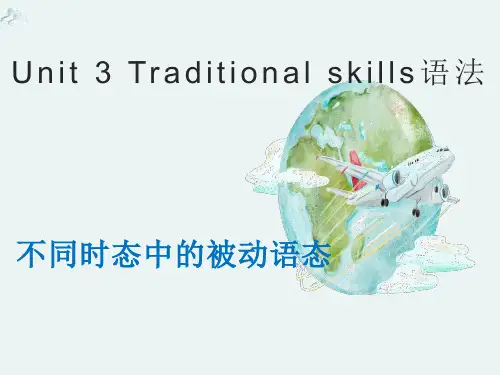
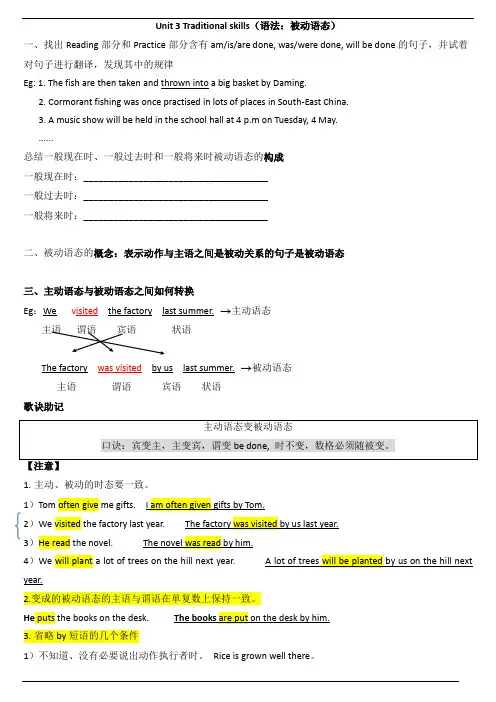
Unit 3 Traditional skills(语法:被动语态)一、找出Reading部分和Practice部分含有am/is/are done, was/were done, will be done的句子,并试着对句子进行翻译,发现其中的规律Eg: 1. The fish are then taken and thrown into a big basket by Daming.2. Cormorant fishing was once practised in lots of places in South-East China.3. A music show will be held in the school hall at 4 p.m on Tuesday, 4 May.......总结一般现在时、一般过去时和一般将来时被动语态的构成一般现在时:_____________________________________一般过去时:_____________________________________一般将来时:_____________________________________二、被动语态的概念:表示动作与主语之间是被动关系的句子是被动语态三、主动语态与被动语态之间如何转换Eg:We visited the factory last summer. →主动语态主语谓语宾语状语The factory was visited by us last summer. →被动语态主语谓语宾语状语歌诀助记1.主动、被动的时态要一致。
1)Tom often give me gifts.2)We visited the factory last year.3)He read the novel.4)We will plant a lot of trees on the hill next year.year.2.变成的被动语态的主语与谓语在单复数上保持一致。
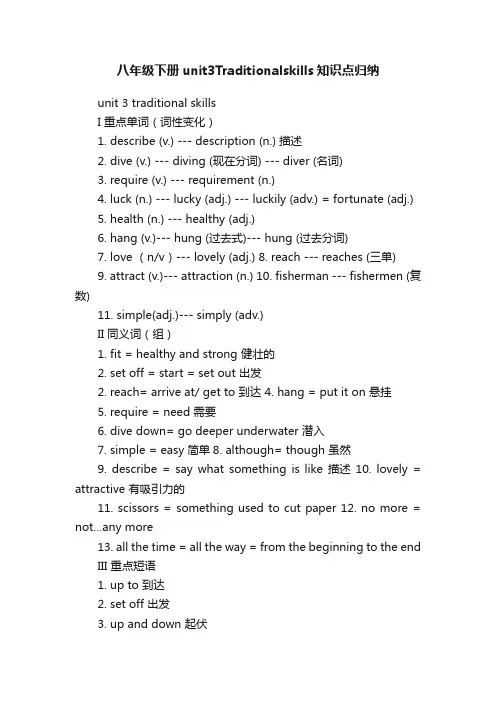
八年级下册unit3Traditionalskills知识点归纳unit 3 traditional skillsI 重点单词(词性变化)1. describe (v.) --- description (n.) 描述2. dive (v.) --- diving (现在分词) --- diver (名词)3. require (v.) --- requirement (n.)4. luck (n.) --- lucky (adj.) --- luckily (adv.) = fortunate (adj.)5. health (n.) --- healthy (adj.)6. hang (v.)--- hung (过去式)--- hung (过去分词)7. love (n/v)--- lovely (adj.) 8. reach --- reaches (三单)9. attract (v.)--- attraction (n.) 10. fisherman --- fishermen (复数)11. simple(adj.)--- simply (adv.)II 同义词(组)1. fit = healthy and strong 健壮的2. set off = start = set out 出发2. reach= arrive at/ get to 到达 4. hang = put it on 悬挂5. require = need 需要6. dive down= go deeper underwater 潜入7. simple = easy 简单8. although= though 虽然9. describe = say what something is like 描述10. lovely = attractive 有吸引力的11. scissors = something used to cut paper 12. no more = not…any more13. all the time = all the way = from the beginning to the endIII 重点短语1. up to 到达2. set off 出发3. up and down 起伏4. after dark 天黑后5. no more 不再6. all the time 一直7. dive down 潜入8. a piece of grass 一根草9. during the day 在白天10. tie…to 11. use sth. to do sth 12. stop sb. from doing sth13. in the late afternoon 黄昏时分14. get ready for 为…做准备15. push…into 把…推进…16. bring…back 把…带回17. throw …into 把…扔进18. at the front of…在…前面19. turn…into…把…变成IV 重点句子1. Although he is over 65, he is very fit and still enjoys working.虽然他已年过65 岁,但身体健康,依然喜欢劳作。
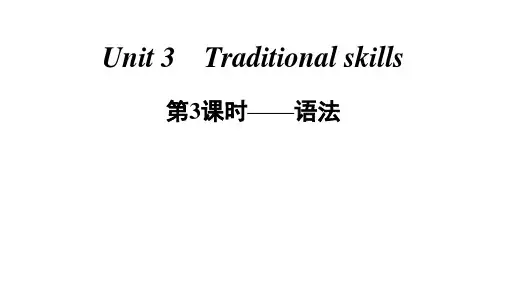
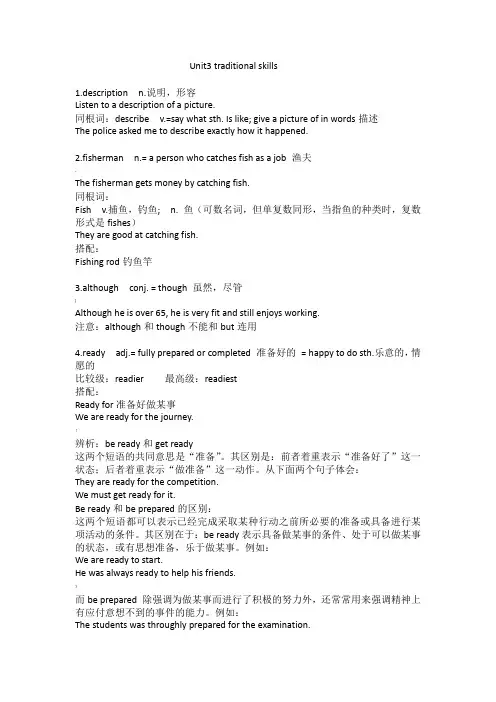
Unit3 traditional skills1.description n.说明,形容Listen to a description of a picture.同根词:describe v.=say what sth. Is like; give a picture of in words描述The police asked me to describe exactly how it happened.2.fisherman n.= a person who catches fish as a job 渔夫,The fisherman gets money by catching fish.同根词:Fish v.捕鱼,钓鱼; n. 鱼(可数名词,但单复数同形,当指鱼的种类时,复数形式是fishes)They are good at catching fish.搭配:Fishing rod钓鱼竿3.although conj. = though 虽然,尽管[Although he is over 65, he is very fit and still enjoys working.注意:although和though不能和but连用4.ready adj.= fully prepared or completed 准备好的= happy to do sth.乐意的,情愿的比较级:readier 最高级:readiest搭配:Ready for准备好做某事We are ready for the journey.!辨析:be ready和get ready这两个短语的共同意思是“准备”。
其区别是:前者着重表示“准备好了”这一状态;后者着重表示“做准备”这一动作。
从下面两个句子体会:They are ready for the competition.We must get ready for it.Be ready和be prepared的区别:这两个短语都可以表示已经完成采取某种行动之前所必要的准备或具备进行某项活动的条件。
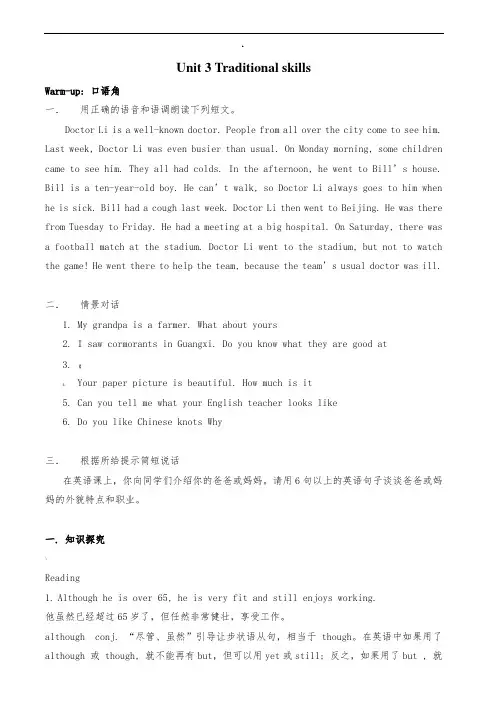
Unit 3 Traditional skillsWarm-up: 口语角一.用正确的语音和语调朗读下列短文。
Doctor Li is a well-known doctor. People from all over the city come to see him. Last week, Doctor Li was even busier than usual. On Monday morning, some children came to see him. They all had cold s. In the afternoon, he went to Bill’s house. Bill is a ten-year-old boy. He can’t walk, so Doctor Li always goes to him when he is sick. Bill had a cough last week. Doctor Li then went to Beijing. He was there from Tuesday to Friday. He had a meeting at a big hospital. On Saturday, there was a football match at the stadium. Doctor Li went to the stadium, but not to watch the game! He went there to help the team, because the team’s usual doctor was ill.二.情景对话1.My grandpa is a farmer. What about yours2.I saw cormorants in Guangxi. Do you know what they are good at3.【4.Your paper picture is beautiful. How much is it5.Can you tell me what your English teacher looks like6.Do you like Chinese knots Why三.根据所给提示简短说话在英语课上,你向同学们介绍你的爸爸或妈妈。
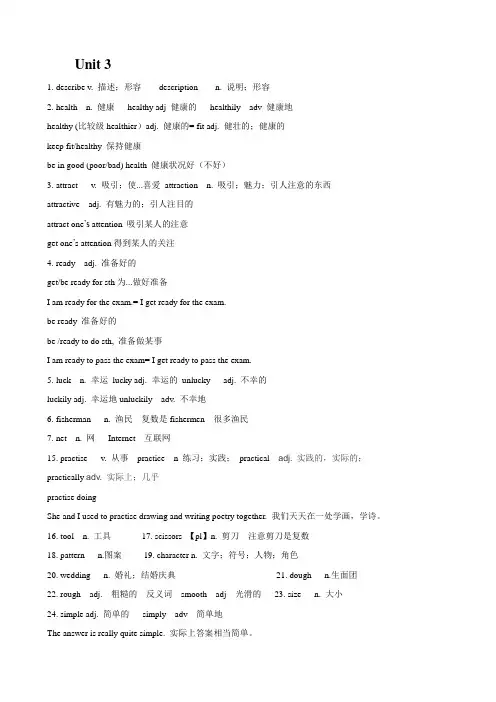
Unit 31. describe v. 描述;形容description n. 说明;形容2. health n. 健康healthy adj 健康的healthily adv 健康地healthy (比较级healthier)adj. 健康的= fit adj. 健壮的;健康的keep fit/healthy 保持健康be in good (poor/bad) health 健康状况好(不好)3. attract v. 吸引;使...喜爱attraction n. 吸引;魅力;引人注意的东西attractive adj. 有魅力的;引人注目的attract one’s attention 吸引某人的注意get one’s attention得到某人的关注4. ready adj. 准备好的get/be ready for sth为...做好准备I am ready for the exam.= I get ready for the exam.be ready 准备好的be /ready to do sth, 准备做某事I am ready to pass the exam= I get ready to pass the exam.5. luck n. 幸运lucky adj. 幸运的unlucky adj. 不幸的luckily adj. 幸运地unluckily adv. 不幸地6. fisherman n. 渔民复数是fishermen 很多渔民7. net n. 网Internet 互联网15. practise v. 从事practice n 练习;实践;practical adj. 实践的,实际的;practically adv. 实际上;几乎practise doingShe and I used to practise drawing and writing poetry together. 我们天天在一处学画,学诗。
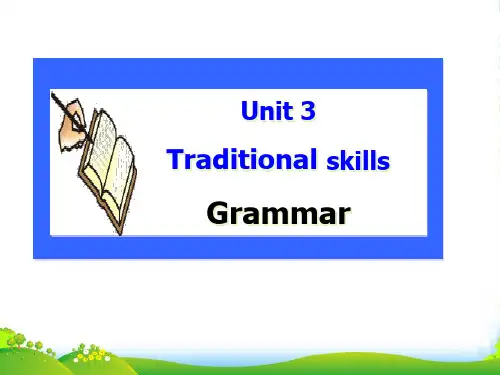
Unit 3 Traditional skills一、要点概括二、hang on 用作电话用语(其后可接a minute, a moment, a while之类的词),意为:等一下;别放下电话;别挂断。
1.reach 除了“到达”外,还有“伸手去够或拿”的意思。
如:Some oranges are hard to reach.The girl was short so she couldn’t reach the cup on the table.【区别】get, reach和arrive♣get是不及物动词,常和to连用。
但当“到达”的地点是home或副词(here, there)时,to需要省略。
如:When did you get there last night?I get home at 7:00 pm every day.♣ arrive为不及物动词,后须加上介词in/ at才能连接表示地点的名词。
表示到达大城市或国家时要用arrive in,而到达乡村、车站等小地方则用arrive at。
如:We arrived in London last week.The doctor arrived at the village at last.♣ reach为及物动词,其后既可以跟名词也可跟副词。
如:I reached Beijing the day before yesterday.We reached here on foot.一、单词拼写。
1.The English teachers r________ the students to listen carefully.2.Let’s h__________ the picture on the wall.3.When he r________ Guangzhou, it was almost 11 pm.4.The books over there are on science. Waht about the r________.5.Eating much vegetable is good for you to keep f_________.二、完成句子。
Unit3 traditional skills1.description n.说明,形容Listen to a description of a picture.同根词:describe v.=say what sth. Is like; give a picture of in words描述The police asked me to describe exactly how it happened.2.fisherman n.= a person who catches fish as a job 渔夫The fisherman gets money by catching fish.同根词:Fish v.捕鱼,钓鱼; n. 鱼(可数名词,但单复数同形,当指鱼的种类时,复数形式是fishes)They are good at catching fish.搭配:Fishing rod钓鱼竿3.although conj. = though 虽然,尽管Although he is over 65, he is very fit and still enjoys working.注意:although和though不能和but连用4.ready adj.= fully prepared or completed 准备好的= happy to do sth.乐意的,情愿的比较级:readier 最高级:readiest搭配:Ready for准备好做某事We are ready for the journey.辨析:be ready和get ready这两个短语的共同意思是“准备”。
其区别是:前者着重表示“准备好了”这一状态;后者着重表示“做准备”这一动作。
从下面两个句子体会:They are ready for the competition.We must get ready for it.Be ready和be prepared的区别:这两个短语都可以表示已经完成采取某种行动之前所必要的准备或具备进行某项活动的条件。
其区别在于:be ready表示具备做某事的条件、处于可以做某事的状态,或有思想准备,乐于做某事。
例如:We are ready to start.He was always ready to help his friends.而be prepared 除强调为做某事而进行了积极的努力外,还常常用来强调精神上有应付意想不到的事件的能力。
例如:The students was throughly prepared for the examination.These children ae prepared for the disappointments as well as the joys of life.5.reach v. = get to = arrive at/in到达;抵达= be able to touch it by stretching out your arm or leg触及,去拿,去碰第三人称单数:___________________ 过去式:___________________过去分词:_______________________现在分词:___________________辨析:reach , arrive, get to 的区别三者均可表示“到达”Arrive和get 都是不及物动词,前者较正式,后者则较口语化。
两者之后均不可接宾语,但可接here, there, home之类的表示地点的副词作状语。
例如:What time does the train arrive?We got (arrived)here last night.要表示“到达某地”,需借助适当介词。
Arrive之后通常接介词at 或in ,例如:We arrived at the station five minutes late.They will arrive in Paris next Monday.Get之后通常接介词to ,例如:When we got to the park, it began to rain.The bus gets in at five thirty.Reach通常是及物动词(较get更正式),其后可直接跟地点名词作宾语(不能用介词)例如:He reached Beijing yesterday.主语:reach之后也可接here, there, home等词。
例如:When did he reach home yesterday?拓展:reach除可表示到达某地外,还用于其它意义的到达。
Your letter reached me last week.He has reached school age.6.attract v. = make sb. interested in sb. or sth.吸引The show attracts viewers from all works of life.同根词:attraction n.吸引力,有吸引力的地方或物品The main attraction of the place is the beach.Attractive adj.美丽的,有吸引力的All the goods in this shop are attractive in price.7.hang v.悬挂,吊第三人称单数:_________________ 过去式:________________过去分词:______________________现在分词:__________________注意:hang 的过去式和过去分词为hung,hung,意思是“悬挂,吊”;当过去式和过去分词为hanged,hanged意思是“(被)绞死”8.require v. = need 需要,需求The job requires ten years of work experience.同根词:Requirement n. 需求,需要,必要条件搭配:Require sb. To do sth.要求某人做某事Our teacher requires us to study hard.Require sth.需要某物Working with these children requires a lot of patience.Require doing sth. = require to be done = need doing sth. = need to be done = want doing sth. = want to be done需要做某事Your bike requires repairing. = Your bike requires to be repaired.9.practise v. = work as 从事;keep doing sth. Regularly in order to be able to do it better 练习第三人称单数:_________________ 过去式:__________________过去分词:_____________________ 现在分词:_________________Pat practises playing the piano every day.同根词:Practice n. 练习,实践To be musicians needs hours of practice every day.Practise doing sth.练习做某事He has practised doing his own things.Practice makes perfect.熟能生巧。
辨析:practice, practise的区别Practice可以作动词,也可作名词。
N. 实行,实践,实际,练习v.(美)= practise Daily practice is the trick in learning a foreign language.You’ll practice properly and make steady gains.Practise v.只能作动词“练习,实习,实践,开业,从事”He has practised medicine for a year.10.health n. = the condition of the body with regard to disease健康(状况)同根词:Healthy adj. = well and not suffering from any illness健康的,健全的比较级:_______________ 最高级:___________________搭配:Be bad/ good for health 有害于/益于健康Food with much vitamine is good for our health.11.No more不再辨析:No longer, no more的区别:No longer = not any longer; no more = not any moreNo more和not any more 可以作宾语,no longer不可以。
No longer意思是“不再”,其确切含义为某状态在某个时刻之后不再继续下去了。
所以,当你熊学校毕业了,就可以说:I’m no longer a student.有两个短语和no longer同义,即not...any longer和not ...any more,但其侧重的方面不同。
前者侧重时间,例如:He no longer lives here.= He doesn’t live here any longer.后者侧重程度和数量,例如:You can drink no more. = You can’t drink any more.注意:由于no longer本身就带有否定的含义,即表示“再也不”,所以不能在同一个句子中加入否定词。
I’ll come here no longer.二、重点句型1.In 50 years , perhaps there will be no more cormorant fishermen in the world.2.However, few young people are interested in this type of work.3.Cormorants are good at catching fish because they can swim well under water.4.Although he is over 65, he is very fit and still enjoys working.5.Daming uses several ways to attract fish.。